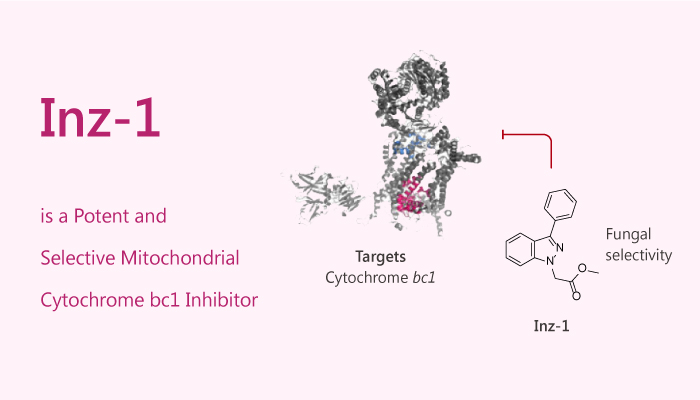This fungal may lead to recurrent infections in immunocompetent individuals, such as diaper rash and vaginal infections. Mild to moderate immunosuppression can lead to more significant C. albicans infections.
Despite various efforts, new classes of antifungals or antibacterial are difficult to deliver during the research. In part, synthetic compounds usually cannot traverse microbial cell walls and membranes even though they possess good activity in vitro. Azoles are useful antifungals now, and they block fungal growth and disrupt ergosterol biosynthesis. However, Azoles also several drawbacks, they are fungistatic, but not fungicidal.
In this article, we will introduce a potent and selective mitochondrial cytochrome bc1 inhibitor Inz-1.
Inz-1 is a mitochondrial cytochrome bc1 inhibitor. It has the potency for yeast over a human with IC50 values of 8.092 μM and 45.320 μM, respectively. Besides, Inz-1 reverses Fluconazole resistance in fungus Candida albicans.
In Vitro, firstly, Inz-1 inhibits the growth of the model yeast S. cerevisiae (strain BY4741) and C. albicans (SC5314) in media containing glucose or glycerol as the sole carbon source. While it leads to only mildly slowing growth in glucose.
Inz-1 is against candida, a human enzyme with IC50 values of 8.092 μM and 45.320 μM, respectively. It against Candida and HepG2 respiring growth with IC50 values of 1.655 uM and >32 μM, respectively.

Next, in both wild-type and F90Y mutant mitochondria, Inz-1 shows inhibition of yeast cytochrome B enzymatic activity in a concentration-dependent manner. It exhibits inhibition of cytochrome bc1 from both S. cerevisiae and C. albicans with an IC50 value of 2.5 μM and 8.0 μM, respectively.
Inz-1 is selective for yeast over human cytochrome bc1, it inhibits human cytochrome bc1 activity only weakly, with an IC50 of 45.3 μM. This is a 5.6-fold higher IC50 for the C. albicans homolog in mitochondria purified from HEK293 human embryonic kidney cells.
In conclusion, as a potent and selective mitochondrial cytochrome bc1 inhibitor, Inz-1 has a bright future in the anti-fungal and anti-bacterial applications. It reduces azole resistance, targeting cytochrome bc1 prevents C. albicans. Inz-1 provides attractive to limit both fungal virulence and drug resistance.
Reference:
Benjamin M Vincent, et al. 2016 Aug 18;23(8):978-991.